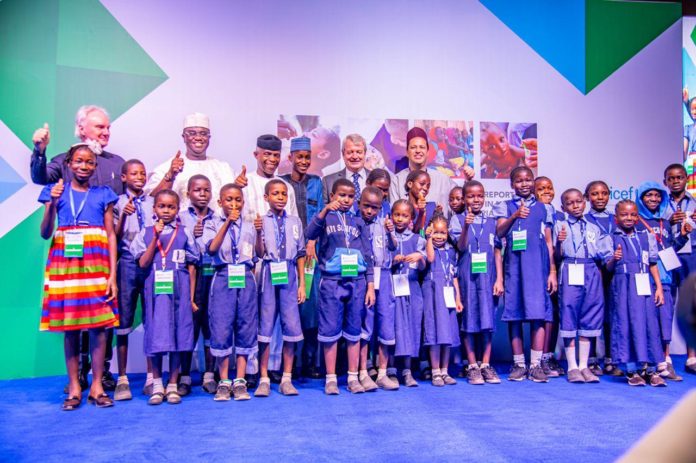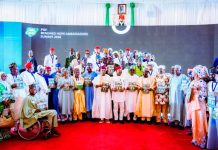
Nigerian government has made tremendous efforts to safeguard the future of every Nigerian child through policies like national poverty reduction strategies, risk children programmes which combine formal education, skills and health as a multifaceted community intervention.
These policies were led by the States and coordinated by the Federal Government and the Sustainable Development Goals (SDGs) implementation plan 2020 to 2030, despite the ravaging Covid-19 pandemic.
The Vice President Yemi Osinbajo made this known, recently, while presenting the reports on Situation Analysis of Children in Nigeria (SitAn) in Abuja, at an event Jointly organized by the Federal Ministry of Finance, Budget and National Planning, UNICEF and Development Partners.
Osinbajo stated that the present administration had made substantial progress in the provision of universal health coverage and care of women at birth, the rising number of states that har now enacted the Child right law from 23 to 30 in just two years, as well as making vast improvements in nutrition, safe guarding education policies like the North East maternal nutrition, the National policy on safety security and violence-free schools.
The Federal government had also developed child guidelines, through the Federal Ministry of Education and continuous engagements with the media and Civil Society in sensitizing the public on behavioural changes as a prerequisite for improvement across all indices.
‘’We still have an estimated huge number of out-of-school children many more with serve and acute, malnutrition, those forced into armed conflicts, denied access to safe drinking water and hygiene, subject to sexual and gender-based violence, exploited and deprived access to health care and deprivation, the work is not certainly nearly done.’’
He said ‘’today marks the national children’s day and has called to action all stakeholders from the Federal Government, States, local Government and Civil society, development partners, caregivers and parents to rise up to our duties and responsibilities as government and citizens to find sustainable solutions regarding the wellbeing of our children.”
Earlier, the Minister of State, Budget and National Planning, Prince Clem Ikanade Agba, disclosed that the Situation Analysis of Children in Nigeria (SitAn), a multi-dimensional studies carried out by multi-sectorial National steering committee made up of all relevant Stakeholder Ministries, Department and Agencies (MDAS) with each MDA constituting thematic groups, was coordinated by the Planning arm of the Federal Ministry of Finance, Budget and National Planning from 2019-2021.
Agba stated that “it’s pertinent to note that the SitAn document stipulates that children under 15 years of age account for 45 percent of Nigeria’s population. Out of this population of children, 10.5 million are out of schools (UBEC, 2019) while 1.5 million have been forced to flee their homes due to conflicts.”
Speaking further, Agba said that it was evident for the statistics that six out of every ten children experienced some form of violence and abuse, adding that Nigeria had about 23 million child brides and this figure was expected to increase by 2030 and double by 2050.
He said “All these show the children suffer poverty more intensely than adults and are more likely to be deprived in all 10 of the multi dimensional poverty indicators (MPI), lacking essentials such as clean water, sanitation, adequate nutrition or primary education’’.
The Country representative of UNICEF Nigeria, Peter Hawkins, in his remarks, stated that Nigeria in 2003 passed the child’s right Act and the welfare of children and today, “we build back after covid-19 that commitment and that compact for the situation of children in Nigeria.”
He added that UNICEF launched a programme in both Lagos and Maiduguri where 5 teams on their own during the Covid lockdown were put forward for the wars on the global level.
The Maiduguri teams taken to schools won the global education; their ingenuity and commitment to ensuring the children’s life are improved every day.
He assured stakeholders of UNICEF’s comittment to work with the minister as well as the statistician General and the whole of the UN to look at the policy implications of the post-covid 19 indicators on women and children in Nigeria and the food consumption and guaranteed that the multi nutrient survey would be completed later this year.
Imaobong UDOH
for: D(Information)
National Planning




